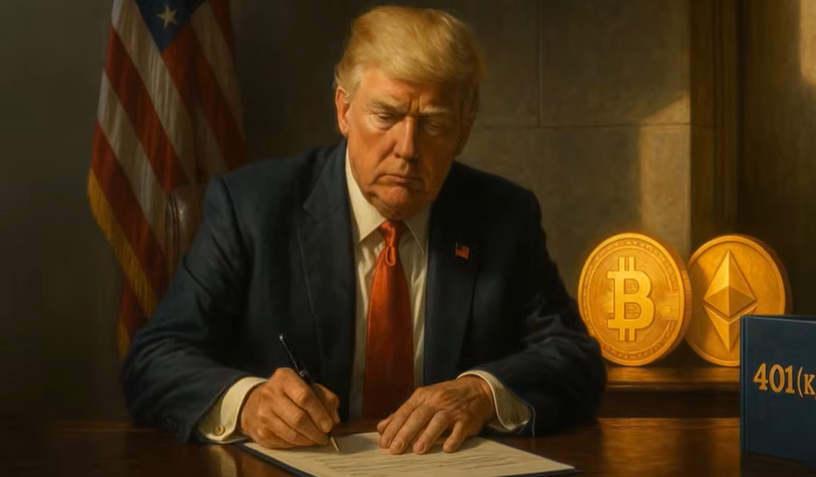Source: cryptoslate
Translation: Blockchain Knight
President Donald Trump will sign an executive order today, directing federal regulators to simplify the legal pathways for including private equity, real estate, cryptocurrencies, and other alternative assets in 401(k) plans.
According to Bloomberg, the directive requires the Department of Labor to reassess the fiduciary guidance under the Employee Retirement Income Security Act (ERISA) framework and coordinate with the SEC and the Treasury Department to provide broader investment channels for defined contribution plans.
This move will view approximately $12.5 trillion of retirement savings in the U.S. as a potential funding channel for asset management companies that have long been restricted from accessing the retail distribution pool. While traditional 401(k) plans still focus on publicly traded stocks and bonds, this government directive will represent the most groundbreaking policy shift to date, incorporating alternative assets, including digital currencies, into mainstream retirement products.
This directive is a continuation of a series of measures since early 2025 that have gradually dismantled previous regulatory barriers. In May, the Department of Labor rescinded a compliance notice from 2022 that warned fiduciaries against offering cryptocurrencies in retirement products without strict scrutiny.
The previous guidance deviated from ERISA's principle-based regulatory approach and adopted stricter standards for digital assets. With the rescission of that guidance, fiduciaries must again evaluate all assets, including cryptocurrencies, based on unified prudent standards rather than special prudence principles.
In March of this year, Trump signed an executive order establishing a strategic Bitcoin reserve and a separate national digital asset reserve pool. Subsequently, the White House hosted "Crypto Week" events, culminating in the signing of the GENIUS Act, the first federal legislation in the U.S. regulating stablecoins. The government also appointed venture capitalist David Sacks as the head of cryptocurrency and AI affairs, further deepening the policy direction of promoting financial innovation through digital assets.
What Does Allowing Cryptocurrencies into 401(k) Retirement Plans Mean?
Opening 401(k) plans to digital assets and private markets marks a shift in market access and reflects a broader ideological restructuring. As the number of publicly listed companies has fallen to nearly half of its peak in 1996, private equity, venture capital, and digital assets have grown to become core elements of capital formation.
Institutional investors, such as endowment funds and pension funds, have increased their exposure to these tools, while retail savers remain limited to more restricted investment options. Faced with allocation caps from institutional clients, asset managers view defined contribution plans as the next frontier.
This latest directive echoes the measures taken during Trump's first term when the Department of Labor allowed retirement plan managers to include private equity in diversified investment options without violating fiduciary duties.
That guidance was rescinded during the Biden administration and is now being restored through this new initiative. According to Bloomberg, previous legal concerns and fears regarding fiduciary responsibilities had hindered plan sponsors from offering illiquid or complex products, but the current policy aims to create a formal framework to reduce perceived compliance risks.
Especially for cryptocurrencies, this directive lays the groundwork for their formal inclusion in portfolios, which had been previously barred due to regulatory opposition.
Fiduciaries will still need to demonstrate compliance with ERISA's prudent principles and duty of care standards but will no longer be restricted by specific asset classes. Its implications include retail savers potentially accessing volatile and high-fee investment tools, necessitating a renewed emphasis on information disclosure, valuation methods, and custodial protections.
The Department of Labor stated it will coordinate with the SEC and other agencies to assess further rule-making. The SEC is expected to take steps to provide access to cryptocurrencies and private market assets for participant-directed plans.
At the same time, companies like Blackstone, Apollo Global Management, and KKR, which have long advocated for 401(k) funds to enter private markets, are likely to benefit from their early infrastructure and lobbying efforts.
Critics argue that complex assets may increase risks for savers lacking financial knowledge, especially in the absence of strong regulation or transparent fee disclosures. However, supporters contend that plan products should be determined by fiduciary decision-making rather than blanket exclusions, allowing savers access to the full range of modern capital tools.
The effectiveness of the executive order will depend on the forthcoming implementation steps from federal agencies. Currently, it establishes a policy marker that repositions the retirement system to be more broadly exposed to private and digital asset classes, marking another step by the government to integrate cryptocurrencies into the national economic infrastructure.
免责声明:本文章仅代表作者个人观点,不代表本平台的立场和观点。本文章仅供信息分享,不构成对任何人的任何投资建议。用户与作者之间的任何争议,与本平台无关。如网页中刊载的文章或图片涉及侵权,请提供相关的权利证明和身份证明发送邮件到support@aicoin.com,本平台相关工作人员将会进行核查。





